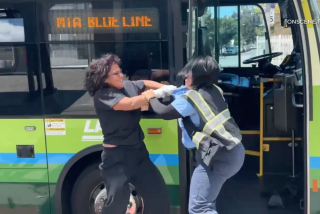Stuff and Nonsense
- Share via
For the life of her, Johnnie Smith has never quite been able to fathom how people who ride buses around the Southland can be so darned forgetful. Maybe those teeth-rattling potholes are shaking loose a few brain screws.
At her tiny Mid-City office, Smith sees the results of a too-hasty dash off the bus: She’s the lost-and-found lady for the Metropolitan Transportation Authority; the collector, temporary caretaker and cataloger of the gizmos, gadgets and gotta-have-back things people thoughtlessly leave behind.
“I just know it: One day I’m gonna walk in and see a head here waiting for me,” she says. “Because some people would leave their heads behind if they weren’t attached.”
A few years back, that head actually did turn up. Somebody riding Line 33 along Venice Boulevard left behind a skull on a seat right there in the back of the bus.
“It didn’t surprise me,” the lost-and-found lady says. The skull was later donated to school officials. “I figured it was a school project. At least that’s what I’d like to think.”
In 15 years on the job, the 59-year-old Hancock Park resident has found full sets of dentures and partials, bowling balls and guitars, beepers, briefcases, teddy bears and Bibles.
Unlike her customers, she’s well organized, keeping her novels, radios, wallets, cameras, children’s lunchboxes, diamond rings, Rolex watches and thousands of keys neatly stacked on clearly labeled shelves.
One million times a day, passengers board about 1,900 MTA buses that travel on lines from Pacoima to the Palos Verdes Peninsula. And every day, the lost-and-found lady receives a heavy bag filled with the often-goofy stuff they forget. When Smith dons her surgical gloves and empties the day’s contents, who knows what’s going to pop up?
Like the day she found the attache case full of sexual devices or the bags stuffed with $2,400 in cash or the vials of prescription drugs (and all-too-often illegal substances) or the plastic bags of marijuana or the handguns or the 4-foot-high vacuum cleaner--not to mention the mundane bus passes, umbrellas, laptop computers, cell phones, handkerchiefs, sweaters, coats, neckties, boxes of dirty underwear and shopping bags full of clothes.
There are children’s toys that squeak and squawk and lurch across the floor when she touches them, sometimes making her nearly jump out of her shoes in fright. That’s why Smith now takes the batteries out of everything that crosses her path.
Over the years, she has been confronted by angry women who have accused her of pilfering their lost purses and all the money inside. But she also gets cards and letters of thanks from people surprised and amazed to receive their missing items back intact.
Like the note that read: “Thank you very much for returning my wallet with everything in it. If there was any cash left inside, it’s yours.”
Many lost items come with a return address or ID card; Smith just sends a letter to the chagrined passenger informing them how they can pick up their book or briefcase. Most are lost causes: Of the 10,000 misplaced items collected annually, fewer than one-third are ever reclaimed.
Smith is sympathetic toward the losers. Like the sister who called in search of her lost brother, who she was sure wandered aboard an MTA bus. Or the widow who left behind a leather jacket bearing her husband’s World War II medals.
“This job has taught me compassion,” Smith says. “People lose things that are valuable to them. Sometimes they just want to talk. And you’ve got to listen.”
Not, however, to the old gentleman who lost his teeth and then came back day after day to flirt with Smith. “Now you tell me, what would I want with anybody who couldn’t keep up with his dentures?” (The man later called to say he’d finally found his teeth--among the dirty clothes in his closet.)
If no one claims the missing objects--including signed, autographed or otherwise personalized items whose owners cannot be reached--the MTA gets rid of them. After 60 days on the lost-and-found lady’s shelves, all lost items must meet their maker.
Library books go back to the library, textbooks back to the schools. Everything else not destroyed is sold at auction several times a year, with the proceeds going to the MTA. To some who come to collect their errant possessions, Smith offers advice.
“I asked one woman, ‘How on earth could you leave your purse behind?’ And she told me that she had all these packages, so she put her purse on the floor. I told her, ‘Honey, next time put the packages on the floor and keep the purse on your lap.’ ”
Smith knows the hazards of her trade--that’s why she wears the safety gloves. But they could not have protected her the day she opened a woman’s purse to find those little tinfoil containers of mystery powder.
She took a sniff of one packet only to learn that the contents were the hallucinatory drug PCP.
“Within minutes, I had this strange feeling like the top of my head wasn’t there. I went outside to get some air, and all I could smell was hot dogs. And there wasn’t a hot dog within a mile of this place.”
Adds the lost-and-found lady with a grin: “Let me tell you, that was a weird day. It was the one and only time that I almost lost it.”
More to Read
Sign up for Essential California
The most important California stories and recommendations in your inbox every morning.
You may occasionally receive promotional content from the Los Angeles Times.











